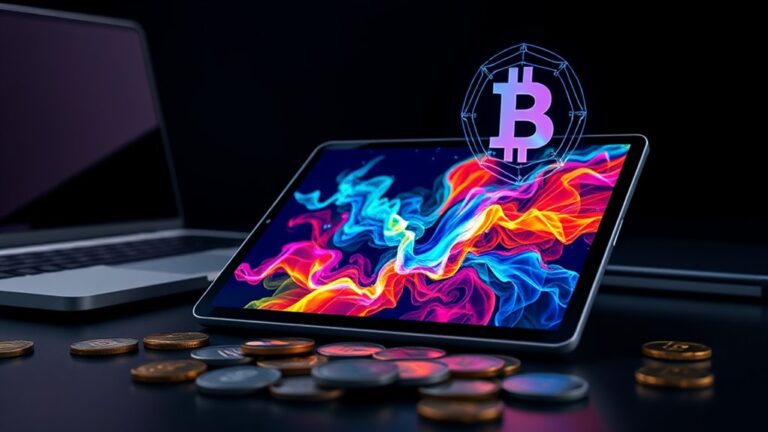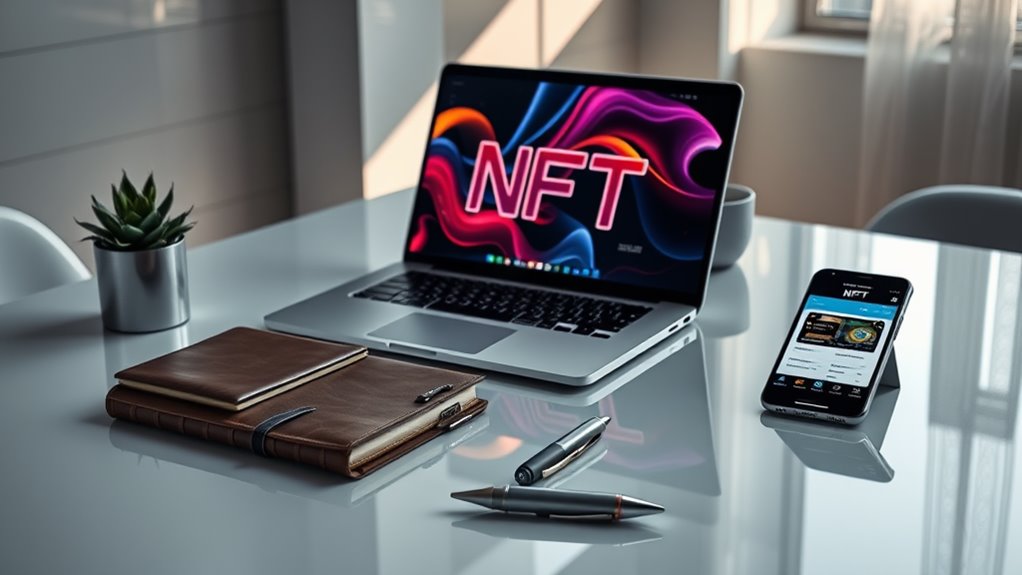
NFT Wallets: The Essential Guide to Storing and Managing Digital Assets
NFT wallets are essential for securely storing and managing non-fungible tokens. They come in various types, including software (hot) wallets for frequent trading and hardware (cold) wallets for long-term security. Users can choose between custodial wallets, which manage keys for them, or non-custodial wallets, which grant full control. Security practices, like using two-factor authentication and keeping seed phrases safe, are vital. By exploring these aspects, one can better navigate the world of digital assets.
Key Takeaways
- NFT wallets come in various types, including software, hardware, custodial, and non-custodial, each serving different user needs and security levels.
- Security is paramount; use hardware wallets and follow best practices to protect against phishing, malware, and exchange hacks.
- Hot wallets are ideal for frequent trading, while cold wallets are best for long-term storage, balancing convenience and security.
- Choose wallets with specialized features like multi-factor authentication and NFT marketplace integration to streamline your digital asset management.
- Utilize off-chain storage solutions, such as IPFS and Filecoin, for reliable and decentralized data management of your NFT collections.
Understanding NFT Wallets: What They Are and Why You Need One
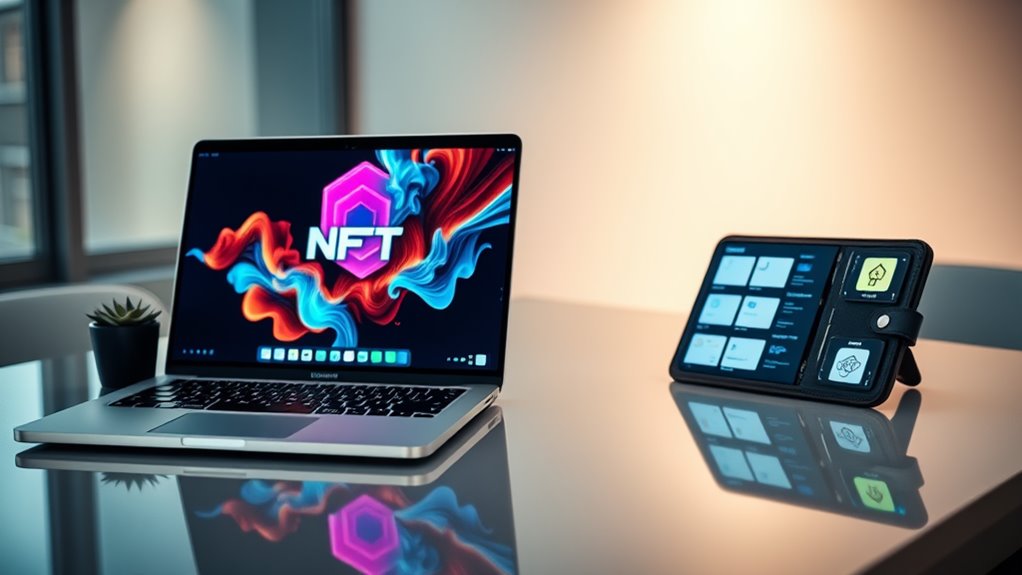
In the domain of digital assets, NFT wallets serve as essential tools for individuals seeking to manage their non-fungible tokens. These digital vaults are designed to securely store, manage, and transfer NFTs, allowing users to interact with various blockchain networks.
NFT wallets come in different forms, including software wallets, often referred to as hot wallets, and hardware wallets, known as cold wallets. They enable users to execute transactions by signing off with private keys, ensuring both security and transparency.
Additionally, NFT wallets provide features for tracking ownership history, managing diverse digital collections, and connecting to multiple marketplaces. Their compatibility with specific blockchains is vital for effective management and trading of NFTs in the evolving digital landscape. Furthermore, just like crypto wallets manage access to digital assets, NFT wallets play a crucial role in ensuring secure interactions with digital collectibles.
The Importance of Security in NFT Storage

The security of NFT storage is a crucial concern for users managing digital assets. Various risks exist, including phishing scams, malware attacks, and exchange hacks. These threats can compromise valuable NFTs if proper precautions are not taken.
| Security Risk | Best Practice |
|---|---|
| Phishing Scams | Verify URLs before logging in |
| Malware Attacks | Use antivirus software |
| Seed Phrase Vulnerabilities | Store phrases offline |
Implementing best practices, such as using hardware wallets, enabling two-factor authentication, and choosing reputable marketplaces, can greatly enhance security. Additionally, keeping software updated and protecting seed phrases are essential steps. By being aware of these risks and practices, users can better safeguard their digital assets against potential threats. Regularly updating security software can also provide an added layer of protection against emerging threats.
Exploring Different Types of NFT Wallets

When exploring different types of NFT wallets, it is vital to understand the various options available, as each serves unique purposes and has distinct features.
Software wallets, stored on devices, offer convenience for frequent transactions but are more susceptible to hacking.
Hardware wallets, however, provide offline storage, ensuring enhanced security for valuable NFTs.
Custodial wallets ease management by holding assets on behalf of users, though they compromise control.
In contrast, non-custodial wallets grant users full control over their private keys.
Multi-signature wallets require multiple approvals for transactions, adding security for shared ownership.
Additionally, compatibility with various blockchains and user-friendly interfaces are significant aspects to evaluate when selecting the right wallet for managing digital assets. Understanding security features is essential to ensure the safety of your digital assets while using these wallets.
Hot Wallets vs. Cold Wallets: Which Is Right for You?
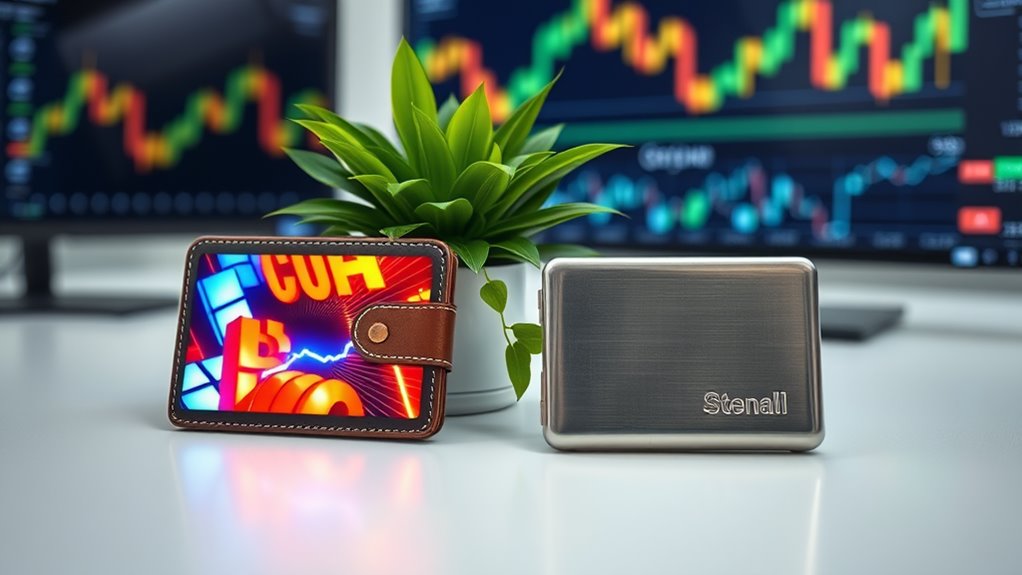
Hot wallets offer convenience for frequent transactions, while cold wallets prioritize security for long-term storage. Here are key features to evaluate:
- Internet Connection: Hot wallets are online; cold wallets are offline.
- Security: Cold wallets provide stronger protection against hacking.
- Convenience: Hot wallets allow quick access for trading.
- Cost: Cold wallets require a purchase, while hot wallets are often free.
- Usage: Hot wallets suit active traders, cold wallets fit those holding assets long-term.
Assessing personal needs and risk tolerance can guide the decision between the two wallet types, ensuring an informed choice in managing digital assets. Additionally, it’s essential to maintain backups of private keys securely offline to prevent loss in case of wallet failure.
The Role of Custodial and Non-Custodial Wallets

Understanding the distinctions between custodial and non-custodial wallets is essential for anyone looking to manage NFTs effectively.
Custodial wallets are managed by third-party custodians, such as exchanges, which handle private keys and provide security. While these wallets are user-friendly and offer support, users must trust the custodian and relinquish control over their assets.
Conversely, non-custodial wallets allow users full control of their private keys, promoting autonomy and privacy. However, they also require users to take responsibility for security, making them potentially complex for beginners.
The choice between custodial and non-custodial wallets ultimately depends on a user’s preference for convenience versus control, as well as their comfort with managing digital assets independently.
Popular NFT Wallet Options to Consider

When considering popular NFT wallet options, users can choose between software and hardware wallets, each offering distinct benefits.
Software wallets, such as MetaMask and Trust Wallet, provide convenience and ease of use, while hardware wallets like Ledger and Trezor prioritize security with offline storage solutions. Additionally, some wallets focus on specific blockchain ecosystems, catering to users who invest in particular types of digital assets, highlighting the diverse landscape of NFT wallet options available today. Understanding the difference between NFTs and cryptocurrencies is essential for selecting the right wallet for your digital assets.
Software Wallets Overview
Software wallets play a vital role in the management of NFTs, offering users convenient access to their digital assets.
These applications, often referred to as ‘hot wallets’, allow for quick transactions but may pose security risks due to their online nature.
Several popular software wallets cater to NFT users:
- MetaMask: Known for its ease of use and Ethereum compatibility.
- Trust Wallet: Supports multiple blockchains and features a Web3 browser.
- Coinbase Wallet: Ideal for beginners, with user-friendly transaction options.
- AlphaWallet: Focused on Ethereum NFTs, allowing minting and collecting.
- Enjin: Specializes in gaming NFTs and provides a marketplace for trading.
These wallets are essential for seamless interaction with NFT marketplaces and decentralized applications. Additionally, they enable users to engage with various NFT marketplaces that offer diverse choices based on their specific interests and blockchain preferences.
Hardware Wallets Comparison
Hardware wallets offer a secure option for individuals looking to store and manage their NFTs effectively. Among the top choices, the Ledger Nano S Plus is praised for its affordability and support of over 15,000 assets.
The Trezor Model T enhances user experience with a large display and advanced security features. For those desiring Bluetooth connectivity, the Ledger Nano X supports a wide range of tokens.
The innovative Ledger Stax stands out with its curved touchscreen for easy management. Alternatively, the Ellipal Titan provides an air-gapped design for heightened security, although it comes at a higher price point.
Each of these hardware wallets caters to different user needs, ensuring a secure environment for managing digital assets.
Specialized Wallets Features
As individuals explore the domain of digital assets, understanding the features of specialized wallets becomes increasingly important.
Specialized wallets offer various functionalities that enhance user experience and security. Key features to evaluate include:
- Security Features: Multi-factor authentication, including 3FA and AES-256 encryption.
- NFT Marketplace Integration: Compatibility with platforms like OpenSea and Shopify for streamlined transactions.
- Cross-Chain Compatibility: Support for numerous blockchains, facilitating diverse asset management.
- User-Friendly Interfaces: Intuitive designs that cater to both beginners and experienced users.
- Multi-Device Support: Accessibility on various platforms, ensuring seamless management across devices.
These features collectively contribute to the effective storage and management of NFTs, making specialized wallets a fundamental choice for digital asset enthusiasts. Additionally, the blockchain ensures security for these transactions, further enhancing the value of NFTs.
Key Security Features in NFT Wallets
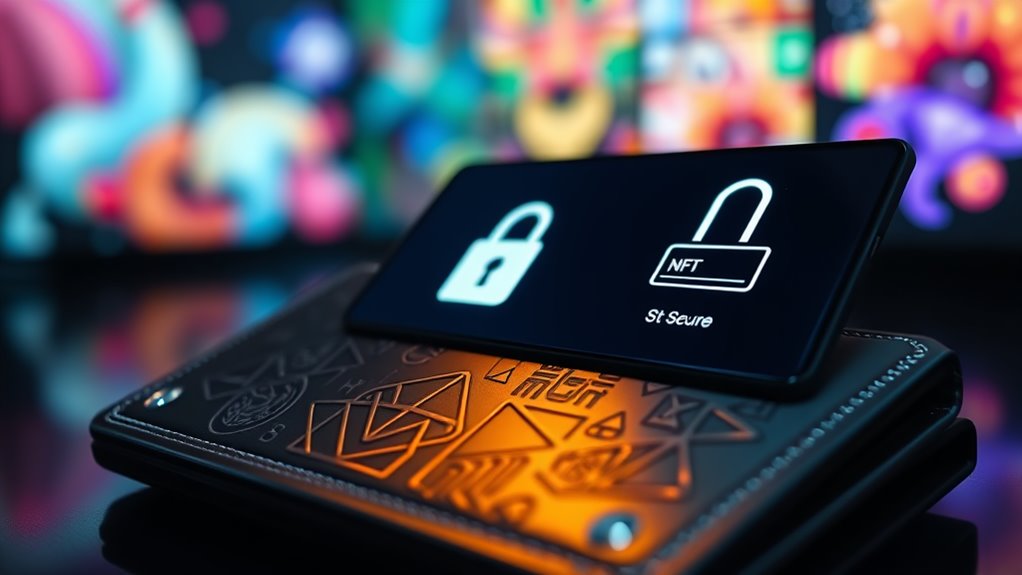
Security is a fundamental aspect of NFT wallets, as it directly affects the safety of users’ digital assets. Key security features include private key control, ensuring users maintain exclusive access to their assets. End-to-end encryption secures data transmission, while multi-factor authentication adds layers of protection. Reputation and community reviews can guide users toward trustworthy wallets. Additionally, understanding NFTs and blockchain technology is crucial for users to make informed decisions about their security.
| Security Feature | Description | Importance |
|---|---|---|
| Private Key Control | Users have sole access to their private keys. | Prevents unauthorized access. |
| Multi-Factor Authentication | Requires multiple verification steps for access. | Enhances security considerably. |
| Seed Phrases | Used for wallet recovery; must be stored securely. | Critical for asset recovery. |
These features collectively contribute to a robust security framework, safeguarding digital assets against potential threats.
Off-Chain Storage Solutions for NFT Data
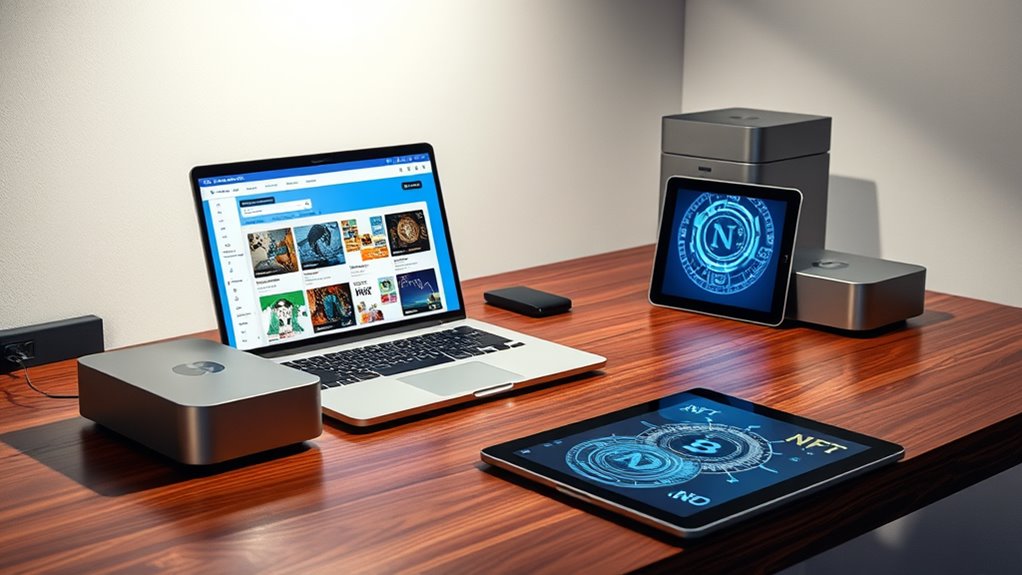
Off-chain storage solutions play an essential role in the management of NFT data, addressing the limitations of on-chain storage. These solutions provide resilience and security, ensuring that digital assets remain accessible through decentralized systems.
Key features of off-chain storage include:
- IPFS: A decentralized network that distributes data across multiple nodes, enhancing reliability.
- Filecoin: Works alongside IPFS for long-term storage, ensuring data persistence.
- NFT.Storage: Combines Filecoin with on-chain endowments to maintain accessibility.
- Alternative Options: Crust and Arweave offer additional decentralized storage solutions.
- Censorship Resistance: Decentralized systems mitigate risks associated with data control and potential censorship.
Best Practices for Managing Your NFT Collection

Managing an NFT collection effectively requires a strategic approach that encompasses various aspects of ownership and investment.
First, utilizing hardware wallets, such as Ledger or Trezor, enhances security by keeping private keys offline, minimizing the risk of hacks. Additionally, employing software wallets for convenience should be balanced with awareness of their vulnerabilities. Regular updates and secure seed phrase management are essential for asset protection.
Utilizing hardware wallets enhances security by keeping private keys offline, while software wallets offer convenience with necessary precautions.
Portfolio management tools can track NFT values and performance, helping owners make informed decisions. Engaging in thorough market research and community monitoring aids in identifying trends and potential risks. Furthermore, understanding NFT royalties can help collectors maximize their potential returns on investment when reselling their digital assets.
Finally, implementing multi-signature wallets increases security by requiring multiple approvals for transactions, ensuring a safer management environment for digital assets.
Ensuring Compatibility With NFT Marketplaces

Ensuring compatibility with NFT marketplaces is essential for seamless transactions and effective management of digital assets.
Users must consider the supported blockchain networks of their wallets, as many marketplaces operate on specific chains like Ethereum or Solana.
Additionally, transaction fee considerations can impact user choices, as fees vary considerably across different blockchains, influencing the overall cost of buying and selling NFTs. As the market evolves, understanding the Virtual Land NFTs will become increasingly important for investors looking to engage in digital property ownership within the metaverse.
Supported Blockchain Networks
The landscape of supported blockchain networks plays a crucial role in the compatibility of NFT wallets with various marketplaces.
Different blockchains offer unique features that enhance user experience and accessibility.
- Ethereum: The most popular choice, supporting ERC-721 and ERC-1155 token standards.
- Binance Smart Chain: Known for its BEP-721 standard and EVM compatibility.
- Polygon: Provides faster transactions and lower costs through its proof-of-stake mechanism.
- Solana: Offers a fast hybrid mechanism, resulting in low transaction fees.
- Flow: Specifically designed for NFTs, powering projects like NBA Top Shot.
Understanding these networks is essential for users looking to effectively manage and store their digital assets across various NFT marketplaces.
Transaction Fee Considerations
Transaction fees represent a significant consideration for users traversing the NFT marketplace landscape. High gas fees on Ethereum can vary greatly, often reaching $50 or more during peak times, impacting buyers and creators alike. Understanding the fee structures of various platforms is essential for minimizing costs.
| Platform | Transaction Fee |
|---|---|
| Ethereum | Variable (up to $200) |
| OpenSea | 2.5% of sale price |
| SuperRare | Higher commission |
| Foundation | Higher commission |
| The Open Network | ~$0.0025 per transaction |
Utilizing strategies such as lazy minting and timing transactions during low-demand periods can help reduce overall costs. By carefully selecting the right marketplace and blockchain, users can enhance their profitability in the NFT space.
Frequently Asked Questions
Can I Use Multiple Wallets for My NFTS?
Yes, utilizing multiple wallets for NFTs is advisable. This approach enhances security, facilitates diverse interactions across blockchains, and improves asset management, though it also introduces complexity and requires careful organization of recovery phrases and keys.
How Do I Transfer NFTS Between Different Wallets?
To transfer NFTs between wallets, one must first access the original wallet, select the NFT, enter the recipient’s address accurately, and confirm the transaction, ensuring compatibility and double-checking details to avoid costly mistakes.
What Happens if I Lose My Wallet’s Private Key?
Losing a wallet’s private key results in irreversible access loss to assets, significant financial consequences, and no recovery options. Users must create a new wallet, as exposed keys can lead to unauthorized access and theft.
Are NFT Wallets Mobile-Friendly?
Like a trusty sidekick, mobile NFT wallets offer convenience and accessibility, supporting multiple blockchains and providing user-friendly interfaces. They enable easy management of digital assets, ensuring collectors can engage with their NFTs anywhere, anytime.
Can I Create My Own NFT Wallet?
Creating a personal NFT wallet is possible, but it requires significant knowledge of blockchain technology and coding. Alternatively, using established platforms is easier for most users, offering convenience and security without the complexity of development.
Conclusion
In summary, understanding and managing NFT wallets is essential for anyone involved in the digital asset space. By choosing the right type of wallet, ensuring security, and following best practices, collectors can protect their investments effectively. For example, a hypothetical collector who uses a cold wallet to store valuable NFTs can safeguard their assets from online threats, highlighting the importance of taking security seriously in the evolving world of digital collectibles.



